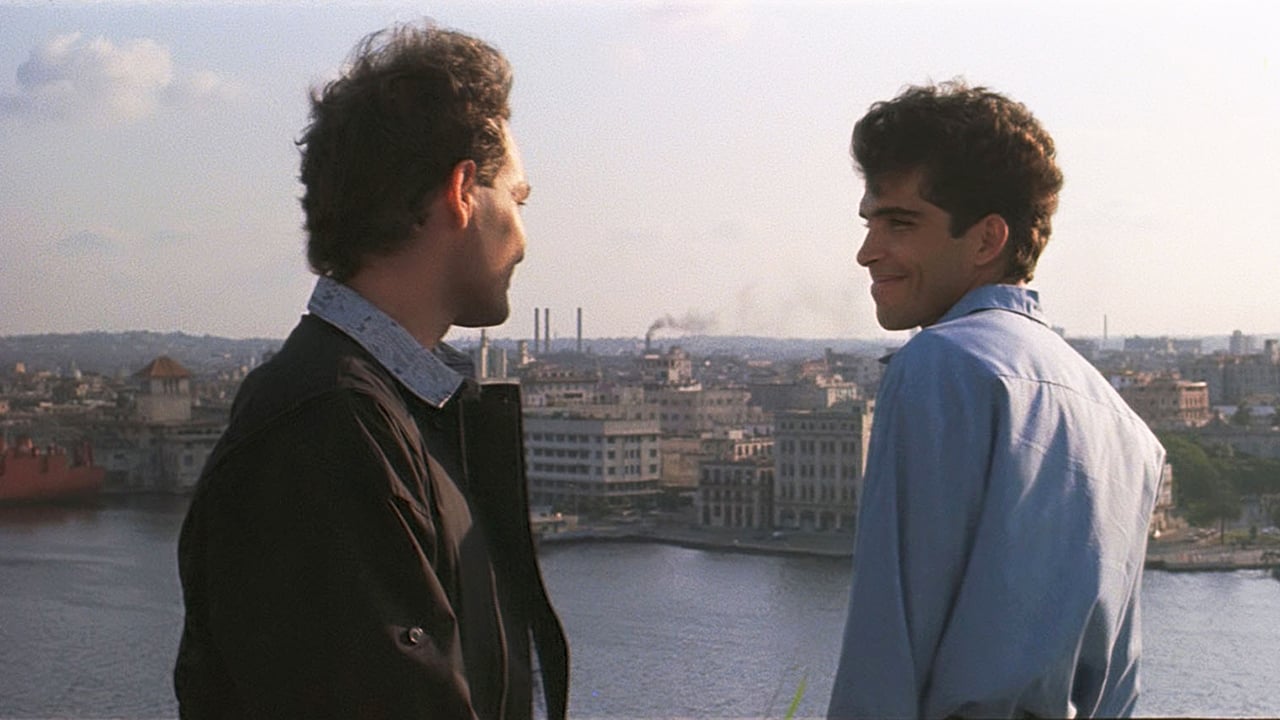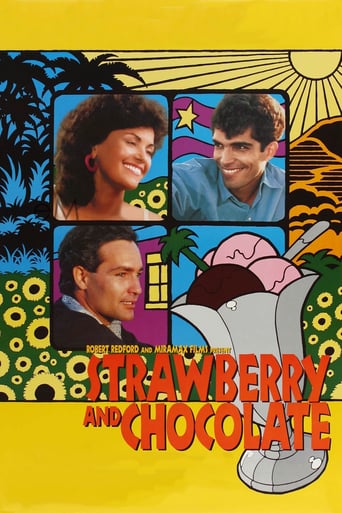BlazeLime
Strong and Moving!
Huievest
Instead, you get a movie that's enjoyable enough, but leaves you feeling like it could have been much, much more.
Kien Navarro
Exactly the movie you think it is, but not the movie you want it to be.
Yazmin
Close shines in drama with strong language, adult themes.
MartinHafer
"Strawberry and Chocolate" is a Cuban film that was nominated for the Best Foreign Language Oscar--losing to "Burnt By the Sun" (my personal favorite was "Eat, Drink, Man, Woman"). And, although the film is set in communist Cuba and is about a gay man, you can enjoy the film regardless of your orientation (political or sexual). It's simply well made and interesting.David is a very straight young man who is an unquestioning lover of the Cuban revolution. One day, he's approached by Diego and lured to Diego's apartment. However, because David is certainly not gay, Diego's conquest never occurs and David leaves. When David tells a friend about this, this friend encourages David to return to spy on Diego. After all, he's a gay religious man and has international ideas--and MUST be an enemy of the state. Something strange happens, however, and Diego and David become friends--something that challenges both of them. Diego must learn to deal with a non-sexual male friend and David must realize that you can still love your country without being straight or having a love of life outside Cuba.The film works mostly because the acting is quite nice and the story universal. Even with a few anti-American remarks at one point, the film is one anyone can enjoy. And, I was surprised that this Cuban film was willing to question what it is to be patriotic--and how Cuba in 1993 was not exactly tolerant when it came to homosexuality. Fascinating.By the way, there is a reasonable amount of nudity in this one, so you may want to think twice about having younger folks watch the film.
Boba_Fett1138
This is a rather good and surprising Cuban movie, focusing on homosexuality in Communist Cuba. It's not the sort of movie you expect coming from Cuba and on top of that it also isn't a movie that stays on the surface but goes in into the subject real deep.It's not a movie that focuses on the physical relationship between the two main characters but more between the spiritual relationship of the two, which is a surprising approach. So, it's not a 'standard' movie about two man falling in love with each other, as you at first might expect when watching this movie. It's a movie that goes much deeper and therefor gets more layered, interesting and compelling to watch. It's great to see how the two of them grow toward each other, in a non-forced or formulaic way. It feels like a warm and very realistic movie, since it never chooses to diverse from its main plot-line and mainly focuses purely on the two main characters of the movie.Vladimir Cruz gives a good and realistic performance. But one thing that bothered me about him was that he was very popular in both male and female camp, which seemed weird and funny to me, since he really didn't looked like an handsome guy. But who knows, maybe this is the Cuban's idea of a pretty looking man. Jorge Perugorría also did a good job, although he performance as an homosexual character seemed a bit too feminine and over-the-top to me at certain points. He played the character like an obvious stereotype of a gay person but he did it in such a good and sincere way that it wasn't always a problem.I was also surprised by the look and overall atmosphere of the movie. Foreign movies, made outside of Cuba, always focus- and shows its visual beauty, of wide beaches, palms, beautiful music and people living there. It's a sort of an almost surreal and alternate world if you look at it. This movie is however more dark and gritty and shows the ugly side of Havana, both visually as with its themes and underlying comments.Some of the symbolism and underlying messages in the dialog are a bit too obvious, as if they were trying too hard, but this is perhaps the only real flaw in the movie its excellent story and directing of the movie.Don't know why the movie is often being regarded and treated as a comedy. It's above all an heavy drama but done in a light and more pleasant sort of way, but those are no reasons for me to regard this movie as a comedy. The movie uses the more European style and approach of the story and characters. So be sure what to expect when watching this movie.A great and relevant movie because of its themes, and I assume also a big step forward for gay-right and tolerance in Cuba.8/10http://bobafett1138.blogspot.com/
diosaterrorista
The movie was made in a place where everything you do and everything you say is because you been told is the truth. The only truth in Cuba is what the government tells you. They choose what you can and cannot read. That's why the friendship between these two very different man is so unique. A very intelligent homosexual and a heterosexual communist militant, what a pair. Where we see the respect and love they develop for each other. David learns he can show love for another man and still remains who he is. Diego fights for what he believes in. In a society where you need a permit to go anywhere, who much freedom do you really have?. How can a person understands and finds who he really is, if he's not allow to?. "Fresa y chocolate", makes you appreciate the freedom we have, and how prejudice we can really be sometimes.
relias
`Strawberry and Chocolate' (1993)is set in contemporary Havana. The luster of that city has dimmed after nearly four decades of Castro's rule. David (Vladimir Cruz), a student and avid Castro supporter, is on the rebound after losing his girlfriend. He had taken her to a cheap hotel to make love, but the place is so shabby it puts her off. Instead, he promises never to touch her until they marry. In the next scene, she marries someone else while David stands sullenly among the well wishers at the registry office. Then he meets Diego (Jorge Perugorría). Diego, who is flamboyantly gay, parks himself at David's table in an outdoor café to eat a dish of strawberry ice cream. For David, this is suspicious because chocolate is also available. Diego says some people like chocolate, some like strawberry, an innocuous line that gives the movie its title and also hints at the odd couple relationship to follow. Diego does not disguise his sexual interest in David, but is also interested in giving David an education the regime denies him. The older man is far more cultured than his new friend. Offers of books banned in Castro's Cuba, such as a novel by Mario Vargas Llosa or the poems of John Donne, lure David to his apartment for tea and talk. When David reports that Diego is involved with a forbidden art exhibit, he is directed to befriend Diego to find out more information. `Strawberry and Chocolate' thus sets their emerging friendship against the backdrop of two bleak themes: anti-gay prejudice in the Castro regime, and the betray-thy-neighbor expectation of a police state. But almost nobody conforms to type. A woman in Diego's building who is part of the neighborhood Vigilance Committee, on the watch for counter-revolutionary activities, turns out to be a good friend to Diego and then to David. Everyone plays one game with the government, but a different one in their private lives. This is a lesson David has to learn. Encounters with women along the way provide a few subplots, but the heart of the story lies in the hearts of the two men. `Strawberry and Chocolate' is credited to directors Tomás Gutiérrez Alea and Juan Carlos Tabío. The former was, until his death shortly after completing this film, the best known filmmaker in Cuba, winning an international reputation in the 1960's for titles such as `Memoirs of Underdevelopment,' a look at life in Cuba in the early Castro years that tempers criticism with prudence. `Strawberry' is smaller in scale and less overtly political. The film was nominated for an Oscar in 1995 and won awards at film festivals around the world (including the Sundance Festival). American viewers may instantly slot it with Hollywood features that show how straight characters learn life lessons from a wiser gay companion (`Boys on the Side,' `As Good As It Gets'). And at times Diego's excesses recall the worst performances of Harvey Fierstein. Yet superb performances by the two male leads eventually move beyond stereotypes they – and the audience – initially share about each other, transforming their unexpected friendship into a statement that puts the lie to official groupthink in a repressive regime.

